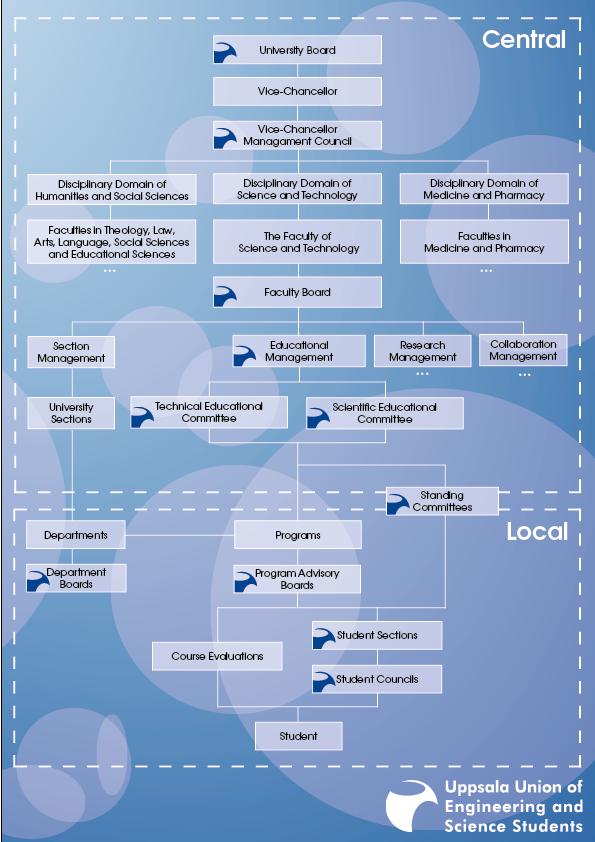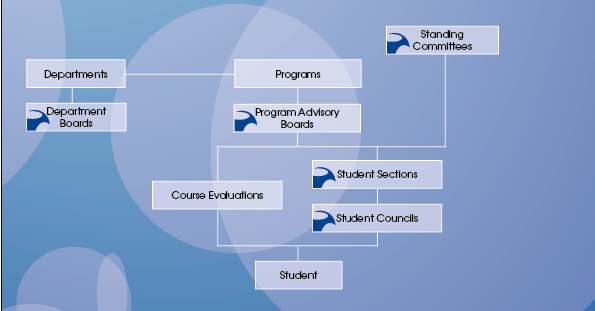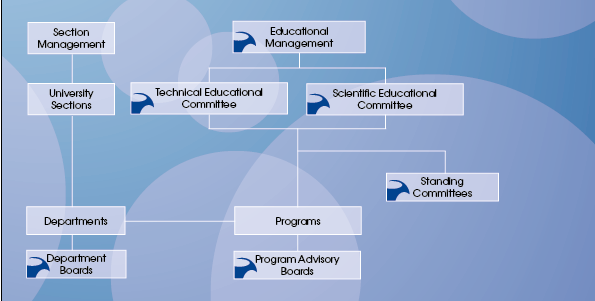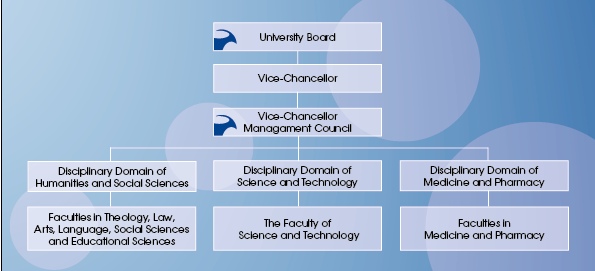Below is a short explanation about Uppsala University's organization and how your opinions, through student liaison officers, is taken further in the organization without you having to learn about each board and council. All boards and councils including student liaison officers from the student union or your student section are marked with an UTN logotype.

The Educational Programs
If you as a student have an opinion about your program, for example a course that does not work in a good way, you can influence by turning to your student section. In your student section there are student liaison officers working on your education and its quality. These student liaison officers organizes Student Councils, where you can come and express opinions about the program and the courses you have taken. You can also affect your education by participating in course evaluations. Course evaluations are a very important basis when developing programs, especially if the number of participators is high.
Your opinions can then, either by the result from course evaluations or through the student liaison officers from your section, get to the Program Advisory Board. The Program Advisory Board is led by the Program Coordinator and contains of the student liaison officers from your section, other student representatives selected by your section, educational leaders and educational principals. The Program Advisory Board primarily discuss issues about program structure, courses and development in these areas.
The student liaison officers from your student section may also raise your issue in one of UTN's standing committees, where UTN's central student liaison officers and student liaison officers from all student sections meet and discuss mutual collaborations or problems.

Education on the Faculty
In the union's standing committee meetings both central and local student liaison officers are discussing issues related to all faculty education. If an issue has been raised on several programs it can be taken further in the university organization. There are also similar forums are for the program directors. The issue will now reach the Technical or Scientific Educational Committee or to one of the Faculty Departments. The educational committees are discussing issues regarding all faculty and are also the committee responsible for approving all study plans. In the educational committees the student union is represented by central student liaison officers and by student representatives selected by the student union. In the organization, the educational committees is located below the Educational Management Team, which includes the Dean of Education, the Chairmen of each educational committee and all central student liaison officers.
All courses provided by the university belong to different deparments, responsible for a specific area. Each department is headed by a Prefect. A program may contain courses from different departments. Issues related to a specific cours, or to several courses in a subject area, can be passed on to the department's management. In all department boards there are student representatives, selected by the student sections.
The departments then belong to a section, in charge of subject areas that are close together. Each section is headed by a Dean. At the Faculty of Science and Technology there are six different sections: Earth Sciences, Physics, Technology, Biology, Chemistry and also Mathematics and Computer Science. If an issue is more general, it can be taken further from the department to the section.

The Faculty of Science and Technology
The Faculty of Science and Technology has three working areas: Education, Research and Collaboration. All sections and departments are working with all these parts. The deans responsible for these areas are together with the section deans a part of the faculty board. The Faculty Board is the faculty's highest decision-making body. The Faculty Board discuss issues that are more extensive and affect larger areas of the faculty and are also the board responsible for approving all new educational programs. In the Faculty Board the student union is represented by central student liaison officers and by student representatives selected by the student union. The Faculty Board is led by one of Uppsala University's three vice-rectors.

The University Management
The Faculty of Science and Technology is the only faculty belonging to one of Uppsala University's disciplinary domains, the Disiplinary Domain of Science and Technology. The other two disiplinary domains are the Disciplinary Domain of Humanities and Social Sciences and also the Disciplinary Domain of Medicine and Pharmacy, which in their turn have own faculties in various areas. Each of the three fields of science have a Vice-Rector who work directly below the Vice-Chancellor. The Vice-Chancellor and the Vice-Rectors represent the Vice-Chancellor’s Management Council together with student representatives, the Deputy Vice-Chancellor and the University Director. The management council is an advisory body and discusses all issues on Vice-Chancellor level.
Above the Vice-Chancellor is the University Board. The University Board is the University's highest decision-making body and handles issues related to the operational level, which is the Vice-Chancellor's responsibility. Most of the members of the University Board are appointed by the government, but there are also teacher representatives and student representatives, selected by the student unions.

